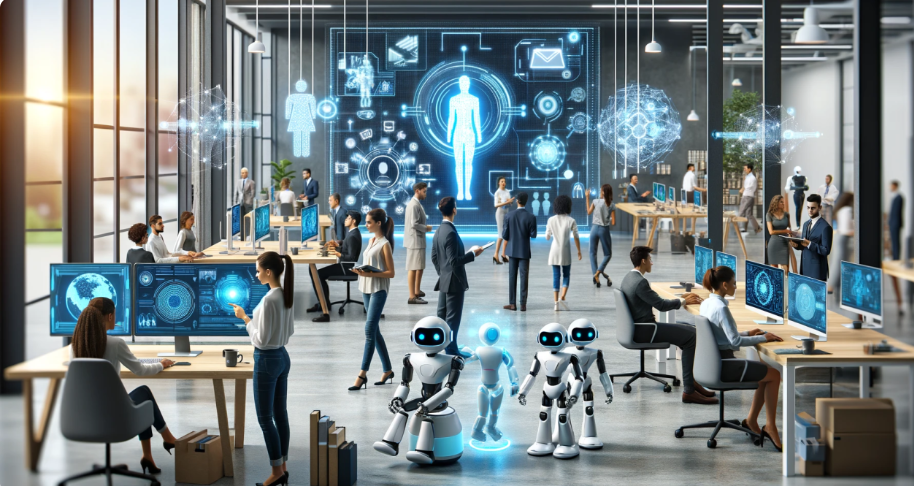AI Agents: The Profitable Future You Can’t Ignore

Take the argument that robots are taking over our jobs. The emergence of intelligent workers, largely overshadowed by their more direct, auxiliarist cousins, heralds a far more difficult and perhaps more practical revolution.
While Siri and Alexa can handle basic functions and simple conversations, AI workers are a different approach. Imagine an automated stockbroker who can predict changes in the market with incredible accuracy, or a dedicated customer service agent who doesn’t appear to convert you not only experience but also analyzes purchases to increase inventory. These represent amazing AI advances, not science fiction dreams.
A new McKinsey analysis states that 60% of firms have already started deploying AI solutions, indicating that the use of AI is growing. By 2030, AI is expected to boost the world economy by up to $15.7 trillion, according to the same estimate. Yet, this expansion won't be spearheaded by to-do list managers in a better suit. Artificial intelligence (AI) agents, which are self-governing systems with the capacity to learn from and adapt to their surroundings, hold the real promise.
The catch is that there will be no victory in this revolution. Artificial intelligence (AI) workers are likely to enhance rather than completely replace human abilities, although some jobs will certainly be done by machines, artificial intelligence will create a million new jobs 97 and eliminate 85 million existing jobs by 2025. Accepting the unique advantages of AI and humans is important.
Pattern recognition, data processing, and task repetition are areas where AI shines. However, people bring critical thinking, empathy, and creativity to the table. Those who can use AI bots as intelligent companions rather than replacements will win in the future.
This collaboration will stimulate innovation across sectors. The real disruption ahead is not the takeover of robots but a powerful new paradigm of human-machine integration. The opportunities are limitless, and there are tremendous economic opportunities for those who can take advantage of this intelligent collaboration. Let’s take a closer look.
AI Agent: What are they?
The influx of AI workers is the real AI revolution, not self-driving cars and robotic chef titles. This is why it might surprise you to learn that although classical AI is decades old and often limited to certain tasks or pattern recognition artificial intelligence (AI) professionals have come a long way.
A. The Power of Autonomy: More than Just Algorithms
Imagine a computer program that can play chess. It can lock the Grandmaster and search the board to select the best moves. It’s not an AI agent, as impressive as that is. The agent does more than just operate the computer. According to a 2023 McKinsey report, implementing AI could boost global GDP to $5.3 trillion by 2030.
Consider a virtual customer support representative. An AI agent may sense a customer's displeasure through voice tone (perception), unlike a standard chatbot programmed with predetermined responses, and can modify its conversation style to defuse the situation (autonomous action). They are significantly more influential and flexible than their non-agent counterparts because of this skill.
B. How AI Agents Operate Inside
What then motivates an AI agent? A look underneath the hood:
- Sensors: The agent's eyes and listening to are its sensors. Depending at the agent's goal, they collect information from the surroundings, which may range from speech and textual content to bodily measurements. According to a 2022 Gartner file, forty% of businesses are currently the use of Internet of Things (IoT) sensors with AI abilties to growth operational performance.
- Mechanism for Making Decisions: This is the agent's mentality. It gathers sensor data, applies sophisticated algorithms to research it (frequently together with system getting to know), and comes to a decision at the great route of action.
- Actuators: The fingers and feet of the agent are referred to as actuators. Based on its picks, they allow the agent to have interaction with the surroundings. This ought to suggest creating language in response for a digital assistant, or it can mean coping with objects for a warehouse robotic.
This perceive-suppose-act cycle is what makes AI marketers so lovely. They maintain gathering data, make smart choices, and take activities that get them closer to their targets. They are therefore considerably more green and adaptive than traditional AI structures.
Beyond and Beyond: Special Characteristics of AI Agents
Most AI experts stop here, but the story doesn’t end here. While traditional AI is the best in some industries, AI professionals can also have some surprising qualities:
- Learning: Many AI professionals can develop through experience. As a result, over time, they are able to make better decisions and become more proficient in any activity.
- Cooperation: AI agents are capable of being programmed to cooperate, exchanging records and planning techniques to perform tough duties. Imagine an assembly line of AI-enabled robots that could without problems regulate to transferring production necessities.
- Explainability: Although certain AI dealers are unable to provide an explanation for their choices, different AI fashions are transparent. Particularly in high-stakes situations, this transparency is crucial for fostering confidence and guaranteeing responsible implementation.
It is clear from these capabilities why AI agents have the potential to completely transform a wide range of businesses. They signify a paradigm shift in the way AI interacts with the outside world, therefore they are more than just a fancy name.
AI Agents' Ascent: Why They're the Future
The prospect of AI bots replacing human labor can make some people laugh. They see apocalyptic environments devoid of people. But the truth is much more complex. AI agents are positioned to become effective allies rather than competitors, and their ascent portends a future full of productivity, accessibility, and ground-breaking discoveries.
Given these capabilities, it’s clear why AI entrepreneurs have the potential to radically transform many industries. They mean a paradigm shift in the way AI interacts with the outside world, so it’s not just a fancy name.
